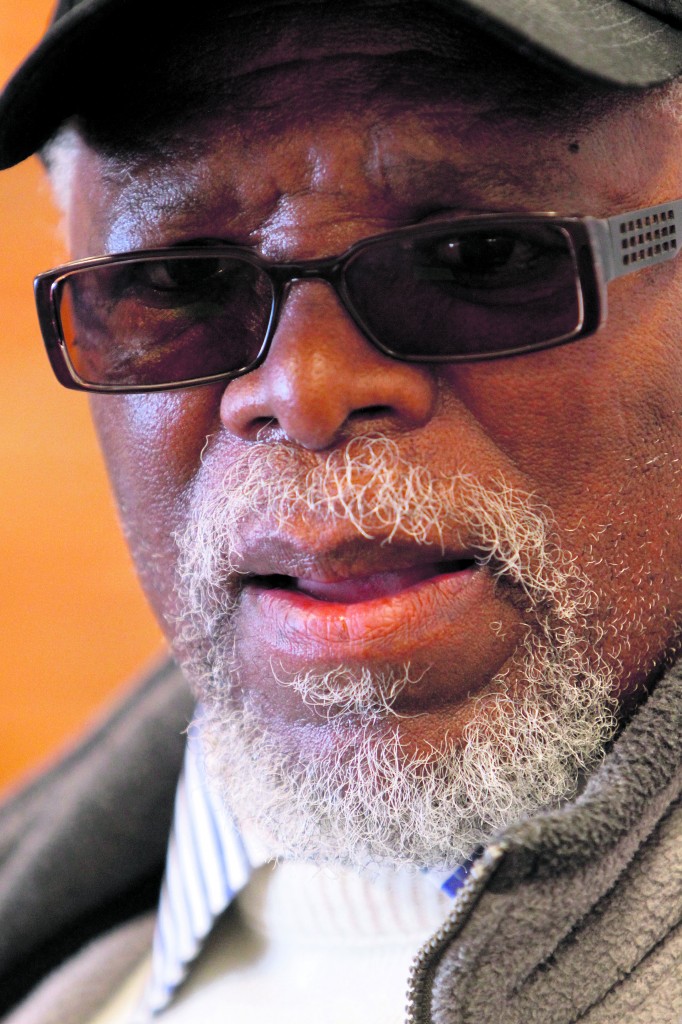“I was never a victim of apartheid,” John Kani says with a wicked smile. An actor, as well as a playwright, novelist and director, Kani savors the momentary puzzlement of his table companions over morning coffee at Phoebe’s restaurant.
Apartheid, the system that sought to make blacks invisible to the ruling white minority, was the law of the land in South Africa, where Kani was born in 1943. Apartheid might have treated the young Kani as less than fully human, but it could not prevent him from co-writing and starring in South African theater’s first international hit, Sizwe Banzi is Dead.

Michael Davis Photo | Syracuse New Times
Kani braved the Siberiacuse winter so he could direct Sizwe Banzi at Syracuse Stage, featuring his son Atandwa Kani in the role he originated more than four decades ago. Few directors can ever speak with such authority.
The wit and irony so conspicuous in Kani’s conversation preview the tone of Sizwe Banzi is Dead. It is not an angry or preachy work, no matter what a moral outrage apartheid is now seen to be.
Instead, the play is plainly factual. Black workers, descendants of people who had been in the country a thousand years, needed photo identification to join the prosperous, industrialized society run by whites. The work permit had a time limit. If a job-seeker was unsuccessful, he was forced to return to the impoverished adjacent Bantustan, his legal residence.
Such a fate was a kind of death. One solution would be to declare him dead, even though he was in good health. This would open other options.
John Kani composed an original shorter draft of the play with Winston Ntshona and Athol Fugard, South Africa’s best-known playwright. The kernel of the conflict, the time limits on work permits, was easily observable but allowed for a stage work that ran only 58 minutes. Kani, who worked for the Ford Motor Company’s assembly plant, provided the additional material, making the whole two hours and 15 minutes. This was prompted by the visit of American industrialist Henry Ford II to the factory.
Although set in real world South Africa, Sizwe Banzi brings to the stage elements of theater of the absurd, a reigning fashion when it opened in Cape Town in October 1972. Kani played Styles the photographer, who is reading the newspaper in the opening scene. It’s an invitation to break through the fourth wall.

In the revival production at London’s Royal National Theatre in March 2007, Kani, then 64, as Styles ad-libbed some timely, uproarious one-liners that could not possibly have been in the original script. The audience, including a tour group sponsored by Syracuse Stage, was unsure whether this was the beginning of the action or a warm-up act to get us all in the mood. John Kani says he’s too old for Styles now. Son Atandwa Kani is expected to preserve the family honor.
Authorities in South Africa were unsettled by Sizwe Banzi, jailing the two performers for 23 days. Ultimately, there was little for censors to seize upon. Not only no agitprop, but everything depicted was pretty much as was happening. No exaggerations. No misrepresentations. Only funny and moving, even plangent. It was what so many audiences said they wanted to see: a good time.
An unprecedented box office hit in South Africa, Sizwe Banzi made its first move to London in 1974, where it won the London Theatre Critics’ Award for Best Play of the Year. It earned even more acclaim in the move to New York City, where Kani and co-star Winston Ntshona won a rare dual Tony Award for Best Actor.

In the last four decades Kani has remained a multi-threat artist in different genres. He has continued as a playwright, both in collaboration and solo. His Nothing But the Truth (2002) appeared simultaneously as a drama and novel. As an actor he has appeared in his own and others’ works, gaining an Olivier nomination in London for Athol Fugard’s My Children, My Africa (1989).
His rumbling baritone and precise diction allow him to make a good fit with Shakespeare, whose plays he has favored, especially The Tempest, a title that comes up often in his conversation. On playing Othello in South Africa before the end of apartheid, Kani cracked, “At least I’ll be able to kiss Desdemona without leaving a smudge.”
The current production premiered at Johannesburg’s Market Theatre, where Kani has many connections in different capacities. It traveled from there to the prestige venue of the McCarter Theatre Center in Princeton, N.J. The arrival at Syracuse Stage coincides with Black History Month and will be linked with discussions and presentations by the ArtRage Gallery, the Paul Robeson Performing Arts Company and SUNY Oswego’s Metro Center in downtown Syracuse.

As a stage work, Sizwe Banzi is Dead has many elements in common with To Kill a Mockingbird, Christopher Sergel’s stage adaptation of the Harper Lee novel set in Depression-era Alabama. Both have succeeded as works of art and are not now seen as rhetorical persuasion, or mere propaganda. Both still speak to audiences in 2015, even if the circumstances of each–South Africa’s pass laws and Alabama’s legal segregation–have disappeared.
Racial discrimination might be the context, but the issue is more philosophical than political. The Kani character, significantly named Styles, is a photographer. How much of our identity comes from our person, and how much from our manipulated image?
Our national dialogue on race began a long time ago, when slavery was legal and shackled black people were judged to be three-fifths of the humanity of whites. For a while we had the veneer of civility, derided by the right as “political correctness,” and the N-word was banned from public discourse. T’ain’t so, of course. Consult the anonymous trolls who comment on any Internet news story, and we can see that stygian, foaming-at-the-mouth hatred is very much with us.
Sizwe Banzi is Dead allows us to look at all this from a distance. It also encourages us to beat back madness with laughter.
Performances of Sizwe Banzi is Dead begin this week, including Wednesday, Feb. 25, and Thursday, Feb. 26, 7:30 p.m.; Friday, Feb. 27, 8 p.m.; Saturday, Feb. 28, 3 and 8 p.m.; Sunday, March 1, 2 p.m.; and Wednesday, March 4, 2 and 7:30 p.m., at Syracuse Stage, 820 E. Genesee St. For details, dial 443-3275 or visit Syracuse stage.org.



